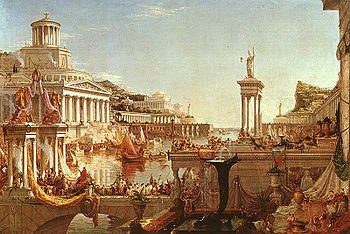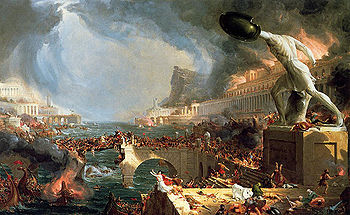|
The Course of Empire
In response to Rick Darby’s skewering of David Brooks’s forecast that America has a bright future based on our providing “emotional experiences” to the rest of the world (also skewered at VFR), Stewart W. posts at Laura Wood’s site:
So, we went from an agrarian economy, to an industrial economy. We quickly blew through the “service” economy, and are now on to the “emotional experiences” economy. As best I can tell, the next step is the “clubbing your neighbor over the head for a can of beans” economy.The title of this entry comes from Thomas Cole’s famous series of five paintings, The Course of Empire, which is part of the permanent exhibit at the New-York Historical Society. The five paintings are “The Savage State,” “The Pastoral State,” “The Consummation of Empire,” “The Destruction of Empire,” and “Desolation,” roughly parallelling Stewart W.’s five stages of America’s industial ascent and decline. From Wikipedia, which does a nice job of explaining the Cole work, here are the third and fourth paintings in the series. Note that the two scenes are from more or less the same angle.
 The Consummation of Empire
Alan Roebuck writes: David Brooks didn’t make up the inane idea that “Americans are great at providing—emotional experiences.” It was apparently codified in a book called “The Experience Economy.”LA replies:
I don’t say that it’s an inane idea. I think “the providing of emotional experiences” is an accurate description of actual businesses today, Apple being a good example. What is inane is (a) the effeminate, precious tone in Brooks’s promotion of that idea; (b) his further idea that the production and sale of refined emotional experiences can be the basis of America’s sustained economic and cultural leadership of the world; and (c) his idea that the rapid Third-Worldization of the United States via mass immigration is compatible with (and even indispensable to) our sustained ability to produce and sell emotional experiences and our sustained global leadership. “Inane” is not a strong enough word for Brooks’s mindset. “Decadent” is closer to the mark. Posted by Lawrence Auster at April 12, 2010 03:15 PM | Send Email entry |
